China real estate, global economic growth to stabilise in 2024: IMAS survey

The majority (65%) of respondents believe the US Federal Reserve will cut rates by as much as 75 basis points (bps) this year.
China’s real estate sector, and the world’s economy overall, should stabilise this year, even as inflation remains sticky. This is according to 79 investment professionals from various fund houses in Singapore, who were surveyed for the 2023 Investment Managers Outlook Survey.
According to survey results released on Jan 4, the majority (65%) of respondents believe the US Federal Reserve will cut rates by as much as 75 basis points (bps) this year, while 16% believe the cuts could amount to 100 bps or more.
This could spell a soft landing for major economies, according to some 57% of respondents in this year’s edition of the annual survey by the Investment Management Association of Singapore (IMAS).
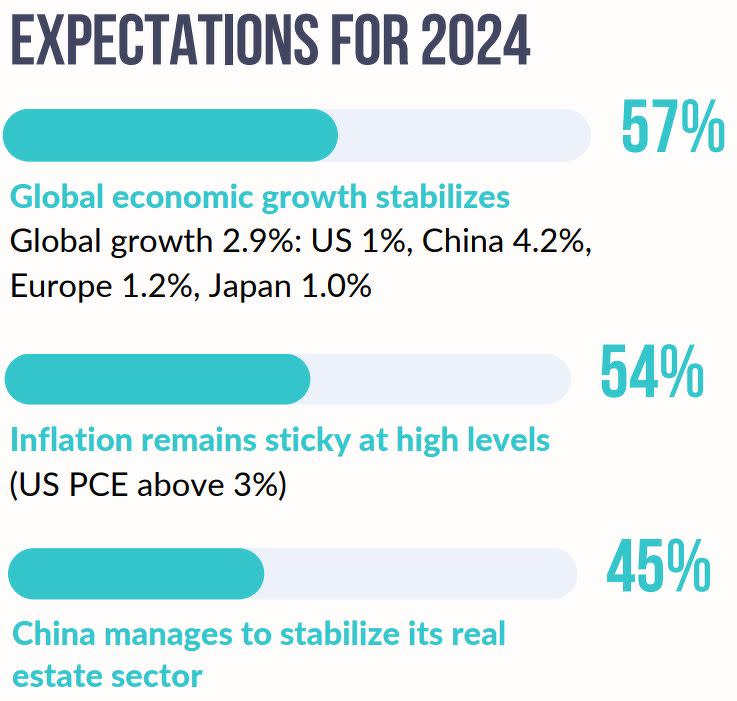
This time last year, respondents had been more optimistic about China’s recovery. Respondents had expected the world’s second-largest economy to lead Asia’s growth to become the best-performing region in 2023.
In reality, generative AI pushed US tech stocks — largely the “Magnificent Seven” — to the fore, while the US avoided a recession and its equities stole the show.
With growth stabilising, the majority of respondents believe the MSCI China and MSCI Asia Ex-Japan indices should both end the year 10%-20% stronger. They also think the Straits Times Index (STI) should end 2024 5%-10% higher.
“A majority of the survey respondents are anticipating growth to be steady this year with easing worries on inflation compared to last year,” says Thomas Kaegi, chairman of the IMAS Development Committee.
“Concurrently, respondents expect the Chinese real estate market to stabilise, leading to a positive outlook for Asian financial markets in 2024,” adds Kaegi, who is also head of UBS Asset Management Singapore.
The annual survey represents the views of “mostly C-suite personnel” from “the largest fund houses” with combined assets under management of over US$35 trillion ($46.47 trillion).
More respondents
This year’s online questionnaire was opened in November 2023, slightly earlier than the typical December period. The Edge Singapore understands that this contributed to the higher number of respondents, up from 53 and 56 in the two prior editions.
The latest edition also included responses from robo-advisers like StashAway, which participated in the survey for the first time.
The survey questions are updated yearly to capture the latest and most pertinent topics in the industry. Respondents were surveyed on the upcoming elections this year, which will see more than 4 billion citizens worldwide heading to the polls.
Some 60% of the survey respondents think the Taiwanese presidential election this month “could surprise the markets”, with results running counter to consensus forecasts. That said, this was before Lai Ching-te, current vice president and candidate from the ruling Democratic Progressive Party, emerged as the frontrunner based on several surveys around the turn of the year.
Jenny Sofian, chairman of IMAS, says: “This survey acts as a pulse check on the industry amid significant changes. This year, we are seeing an increasing demand for innovative products in alternatives and digital assets, overtaking ESG investments for pole position. This reflects an important shift in investor mindsets, led by the growth of millennial investors.”
Waning interest in ESG after underperformance
ESG issues appear in four of the survey’s 12 questions. With the relative underperformance of ESG strategies in recent months, however, respondents no longer think “ESG or impact-focused” strategies will grow in popularity this year.
The option fell from the top spot in the previous edition of the survey to eighth place this time around, replaced by private debt (33%), alternatives (28%), income strategies (28%) and private markets (28%).
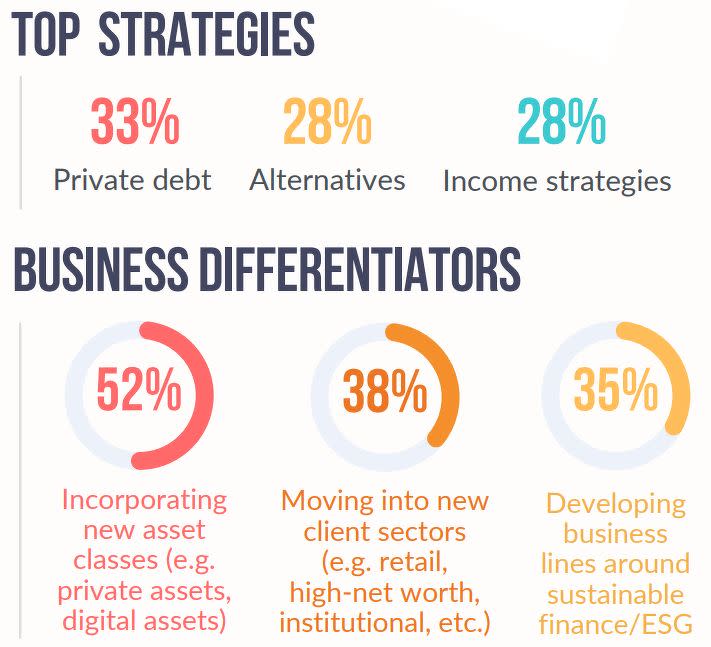
That said, the ESG theme remains in demand among institutional investors. Some 42% of respondents think ESG investments will continue to drive investment growth over the next three years, behind other drivers like the growth of millennial investors (48%) and an increase in demand for innovative products, such as alternative or digital assets (59%).
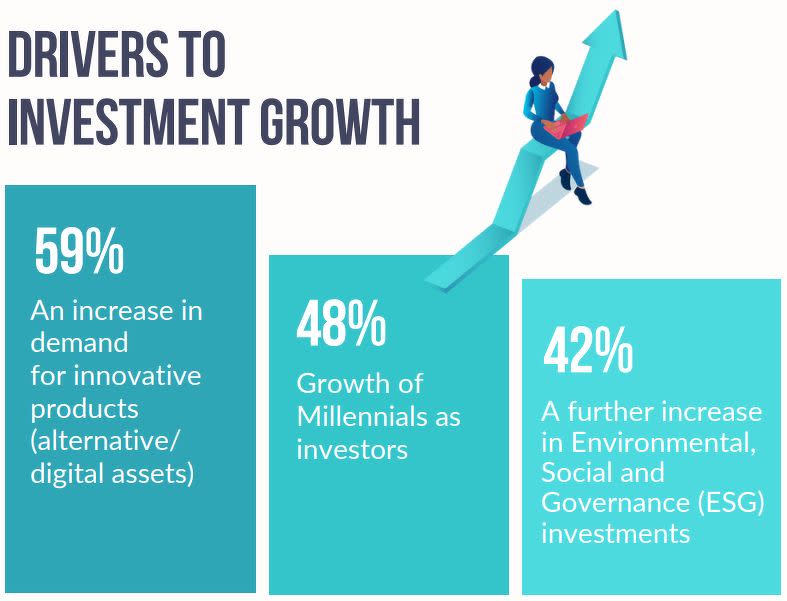
These were also the top three options in the previous edition of the survey, with ESG investments formerly in the top spot.
The ESG strategies of fund houses are unchanged from last year; top of mind for investment professionals are ESG integration, launching best-in-class strategies and aligning with regulations.
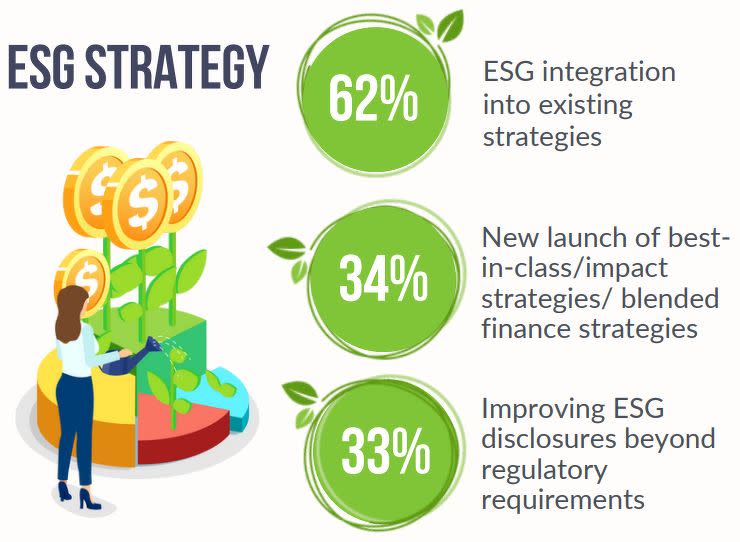
But ESG is also becoming increasingly complex, with respondents listing additional strategies beyond the survey options provided. These include engagement on climate change, nature and biodiversity; increasing the quality and materiality of stewardship work; and partnering with asset owners to drive thought leadership.
Meanwhile, the lack of data standardisation and the multitude of ESG standards remain the most frequently-cited barriers to implementing ESG strategy.
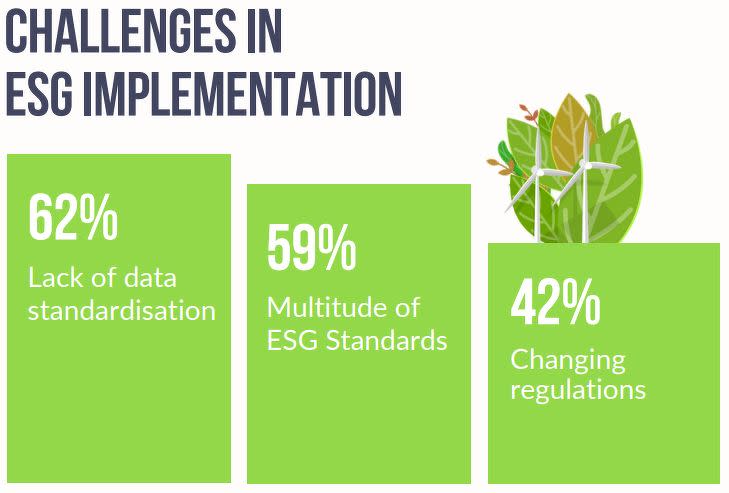
In response to The Edge Singapore’s questions, IMAS says there is scope to refine the breadth and depth of its ESG-related questions, and these could also be included in an upcoming risk and performance survey for fund house professionals.
Upcoming fintech directory
With the rising trend of innovative products, numerous fund managers are looking to expand their capabilities in advanced analytics, machine learning and artificial intelligence, says IMAS.
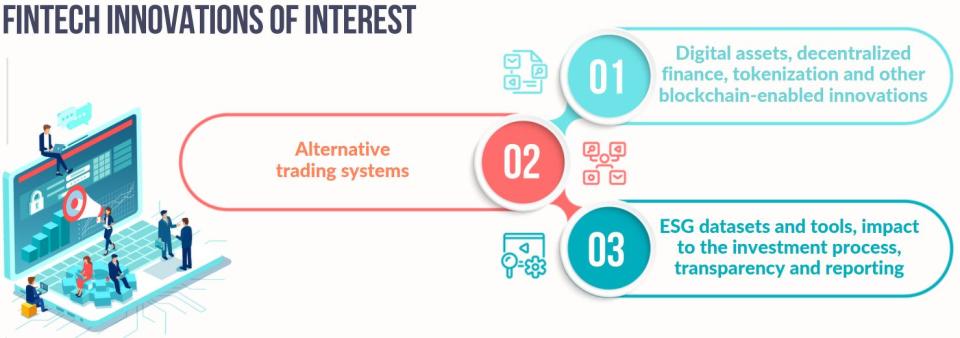
Fund managers anticipate that technology will primarily disrupt fund operations, the middle office and the research industry.

IMAS hopes to further encourage partnerships between fintechs and asset management firms. The association will launch a fintech directory this year, which aims to help asset management firms discover tech solutions other industry players are using, while showcasing members’ innovative solutions.
Infographics: IMAS
See Also:
Click here to stay updated with the Latest Business & Investment News in Singapore
Asia touted as best-performing region this year but economic uncertainty will remain: IMAS
Beware of creating solutions to problems that don't exist: SGX's Loh
World faces 'perfect long storm' of Ukraine crisis, Omicron and stagflation: Tharman
Get in-depth insights from our expert contributors, and dive into financial and economic trends

 Yahoo Finance
Yahoo Finance 